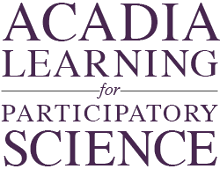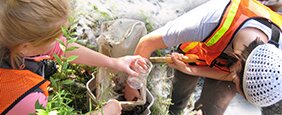News
The Future of Four Seasons in Maine: a Scientist-Teacher-Student Partnership to investigate climate change in seasonally snow-covered watersheds ( a.k.a. The Snowpack Project) kicks off its third year with a summer professional development institute, June 29 through July 1, 2015. We are looking for 15 teachers to join our snowpack project team and to bring snowpack research into their classrooms in the coming school year. Join us!
The three-day professional development institute will cover project- and research-based learning, systems and modeling, and climate literacy—all within the context of understanding Maine's changing climate. The institute is limited to 15 teachers. Teachers will study microhabitats in the vicinity of the Schoodic Institute at Acadia National Park in preparation for engaging students in snowpack research during the upcoming school year. By undertaking a compressed version of field-based science investigations that the snowpack project supports teachers will be better prepared to engage students in authentic research. In addition to collecting and analyzing data, teachers will develop approaches to helping students learn to make sense of data, drawing upon the Acadia Learning Program’s research in the area of data literacy.
GOALS: (1) By working together through a research project, from initial question through final presentation, paired with conversation and reflection with other educators, teachers will be in a better position to support participatory science research activities in their classrooms. (2) Collaborative data analysis and presentation, coupled with a review of data literacy concepts and skills inventories will assist teachers in helping students achieve competence and confidence in working with data.
SETTING: The summer institute will take place on the Schoodic Institute campus in Acadia National Park, surrounded by spruce/fir forests and the rocky coast of the Atlantic.
TIMING: Monday, June 29, 2015-Wednesday, July 1, 2015. Session will begin at 10:00 and will wrap up late Wednesday afternoon. (Sunday night accommodations are available for teachers traveling longer distances.)
COSTS/STIPENDS: There is no cost to teachers participating in the institute. Food and lodging are provided. Participants will receive a stipend of $300 for the 3-day institute.
SPONSOR ORGANIZATIONS: The Acadia Learning project is a joint effort of the Schoodic Institute and the University of Maine’s School of Forest Resources and Climate Change Institute.
FOR MORE INFORMATION: Contact Hannah Webber at Schoodic Institute ().
TO APPLY: Apply online Application deadline- April 30, 2015.
Want to know more about the project? Have a read!
Acadia Learning is pleased to announce the kick-off summer institute for Year Two of the Snowpack Project!
The Future of Four Seasons in Maine: a Scientist-Teacher-Student Partnership to investigate climate change in seasonally snow-covered watersheds ( a.k.a. The Snowpack Project) kicks off its second year with a summer training institute, August 11 through August 14, 2014. We are looking for nine teachers to join our snowpack project team and to bring snowpack research into their classrooms in the coming school year. Joi us!
Summer Institute Description:
This summer the Acadia Learning program will offer a three and one-half-day workshop that will involve nine teachers in professional development in project and research based learning, teaching about systems and climate literacy. Teachers will engage in a study of a small watershed in the vicinity of the Schoodic Education and Research Center (SERC) campus in Acadia National Park as preparation for engaging students in snowpack research during the upcoming school year. By undertaking a compressed version of field-based science investigations that the snowpack project supports teachers will be better prepared to engage students in authentic research. In addition to collecting and analyzing data, teachers will develop approaches to helping students learn to make sense of data, drawing upon the Acadia Learning Program’s research in the area of data literacy.
GOALS: (1) By working together through a research project, from initial hypotheses through final presentation, coupled with conversation and reflection with other educators, teachers will be in a better position to support participatory science research activities in their classrooms. (2) Collaboration and conversation as teachers analyze and present data, coupled with a review of data literacy concepts and skills inventories under development by the Schoodic Institute and the University of Maine, will assist teachers in helping students achieve competence and confidence in working with data.
SETTING: The summer institute will take place on the SERC campus in Acadia National Park, surrounded by spruce/fir forests and the rocky coast of the Atlantic.
TIMING: Institute participants will arrive at SERC Monday morning, August 11. (Sunday night accommodations are available for teachers traveling longer distances.) Sessions will begin at noon on Monday and will wrap up Thursday morning, August 14.
COSTS/STIPENDS: There is no cost to teachers participating in the institute. Food and lodging are provided. Participants will receive a stipend of $350 for the 3½ -day institute.
SPONSOR ORGANIZATIONS: The Acadia Learning project is a joint effort of the Schoodic Institute and the University of Maine’s School of Forest Resources and Climate Change Institute.
FOR MORE INFORMATION AND TO APPLY: Contact Hannah Webber at Schoodic Institute (). Online application form:
Applications are due before July 11, 2014.
This three-year project will engage 1,275 students and 30 high school teachers with professional scientists in research regarding the changing nature of the snowpack across Maine, emphasizing the coastal climate zone where snowmelt provides cues for diadromous fish migration and changes in flood flows. The principal benefit from participating scientists’ perspectives will be the collection of data regarding the character and duration of snowpack in different locations and types of watersheds over a larger number of sites than are currently monitored, including sites distributed across all three Maine climate divisions (Coastal, Southern Interior, and Northern). Students and teachers can collect data across many more sites than scientists can easily sample without student assistance. Data will be used to expand the number and the geographic scope of existing monitoring programs. The creation of an ongoing field-based snowpack monitoring program will bring students into regular contact with working scientists and has the potential to continue year after year. Electronic infrastructure can support increasing numbers of teachers and students in the program through time.
A principal project objective is to show students that watersheds are interconnected systems comprised of physical factors and living things, and that observable effects of short-term variability in weather and long-term trends in climate change in one part of the system can have surprising and unanticipated effects on other parts of the system. In pursuing this objective, the program will build on the first B-WET project, which focused on watershed connectivity through student research on watershed food webs, movement of diadromous fish, and the effects of culverts on fish habitat. This new project will couple students’ snowpack and weather data collection with information about streamflow to facilitate student thinking about both flood flows and fish migration. Diadromous fish rely on various cues when migrating into freshwater streams in the spring, including length of daylight, water temperature, and streamflow rates. A primary concern for fisheries scientists and managers is a gradual decoupling of these signals due to climate change, leading to asynchrony in cues. This project will compile new data and integrate these data with existing information to provide information on the relationship between snowpack and other environmental variables within some of Maine’s prominent watersheds.
The lead institution for this partnership is UMaine, other partners in this research are Maine Sea Grant, NOAA National Weather Service, the US Geological Survey, the Maine RiSE Center, and Acadia National Park.
The National Oceanic and Atmospheric Administration (NOAA)'s Officw of Education recently highlighted Acadia Learning's Acaida B-WET projects. Acadia B-WET encompassed both the Mercury in Watersheds project and the Culverts and Stream Ecology project. Read more at:

 Acadia Learning brings scientists, teachers, and students together in partnerships that result in useful research and effective science education.
Acadia Learning brings scientists, teachers, and students together in partnerships that result in useful research and effective science education.